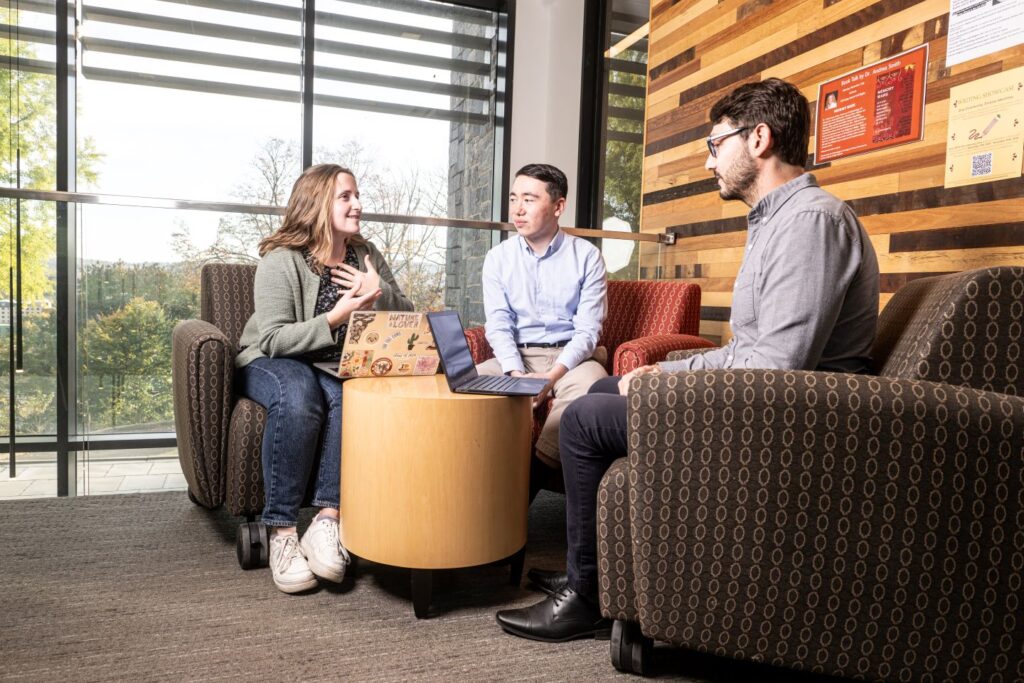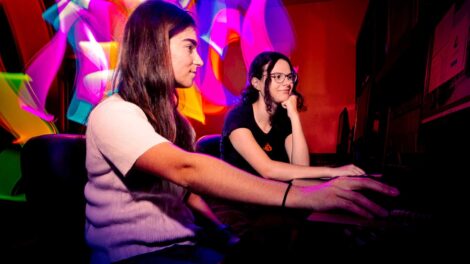Student-faculty research sheds light on overlooked part of World War II history
By Bryan Hay
Prof. Douglas de Toledo Piza and two of his students have been researching an overlooked part of World War II history, and hope to reveal a dark chapter in Brazil’s history that few people have openly discussed.
While historians have documented the forced evacuation and detention of Japanese-Americans living on the West Coast after the attack on Pearl Harbor, a similar internment of the Nikkei community that settled in Brazil in the 1930s faced a comparable situation, yet their story has been largely untold.

Prof. Douglas de Toledo Piza with Chris Kirch ’26 and Sarah Cohen ’24
“The United States was not the only country that interned Japanese populations,” says de Toledo Piza, assistant professor of international affairs, noting that Canada, Australia, and other Latin American countries also forced their Japanese migrant populations into internment camps.
A native of Brazil with a longstanding commitment to migrant justice activism, he has a personal interest in what happened to the Japanese community in Brazil, describing how internment of ethnic Japanese in Brazil, unlike in the fenced camps erected by the U.S. government, occurred in the Amazon rainforest.
“Few facilities were actually built to house internees,” he says. “Nearly 500 families were brought to a place that was only accessible by boat, and the army and the state police controlled the riverbanks. So, they essentially left the entire community there to be on their own.”
Although Brazil ultimately sided with the allies in World War II, its government for a time considered an embrace of fascism and remained on the sidelines.
“The Brazilian government at the time was increasingly authoritarian and flirted with totalitarian ideologies and also sought independence in foreign affairs, kind of trying to get benefits from this ambiguity, both from Germany and the U.S.,” says de Toledo Piza, adding that Brazil ultimately acceded to mounting pressure from the U.S. to join the allied powers.
“But even before that, the Brazilian government was already imposing harsher measures on the Japanese community in Brazil, which included the prohibition of speaking Japanese in public and shutting down schools and cultural centers,” he says. “And now, more and more, there’s interest within the Nikkei community about what happened in Brazil.”
Inspired by the Nikkei community’s desire to set the historical record straight and the interest of students Chris Kirch ’26 (international relations and economics) and Sarah Cohen ’24 (Bergh scholar, international affairs and migration studies) in helping advance that effort, de Toledo Piza says his work is helping bring “a greater sense of social justice in contemporary times.”
“They are really trying to mainstream a narrative that was marginalized for so long and making sure that those silenced voices are no longer silenced,” he adds.
Kirch and Cohen, who have been working with de Toledo Piza since this past summer, discussed in detail what they have learned about this little-known topic.
What is your research all about?
Kirch: It delves into the often-overlooked aspect of Brazil’s history: the detainment of ethnic Japanese populations in internment camps during World War II. The Brazilian government uprooted thousands of Nisei families, denationalized them, and placed some of them in internment camps. The internment camps had limited access to basic necessities, causing immense emotional distress and disrupting social and cultural ties that had been built over generations.

Chris Kirch ’26
Our research delves into the narrative factors that enabled discriminatory policies against Japanese Brazilians during World War II and examines the subsequent impacts on Brazil’s collective consciousness. We also aim to spotlight the current activities of activists, often descendants of those who experienced internment and discrimination firsthand, that challenge xenophobic narratives.
Cohen: Our research is about the abuses committed by the Brazilian government against the Japanese community in Brazil (Brazilian Nikkei) in the 1940s. Specifically, we are interested in how recent activism of Brazilian Nikkei has shaped or reshaped the narratives of these abuses.
What appealed to you about doing research on this project?
Cohen: During my time at Lafayette, I have taken particular interest in the study of migration and (im)mobilities, both inside and outside of the classroom. Since most of my research has been on current migration flows, I was interested in learning more about interpretations of historical mobility restrictions. In addition to my academic and professional interest in migration, I have been working as an organizer in electoral and issue-based advocacy since I was 14 years old, and I was really interested in learning more about the impact that activism can have on shaping historical narratives.
Beyond the content, I was excited by the opportunity to work with Prof. de Toledo Piza on original research. Since his research interests so closely align with my own, I have taken three classes with him, and he currently is both my academic and honors thesis adviser. Over the last two years, I have seen how he prioritizes social justice in his research and teaching, while creating spaces of mutual learning and growth.
Kirch: As a member of the Japanese community, I feel a strong connection to the stories and struggles of Japanese Brazilians during this tumultuous period. Understanding their experiences helps me deepen my own cultural and historical knowledge. It allows me to explore the shared narratives of resilience, discrimination, and the pursuit of justice that unite us across different borders and time periods.
Moreover, engaging in this research project enables me to contribute to the preservation of collective memory. The internment of Japanese Brazilians is a lesser-known chapter in World War II history, and by immersing myself in the subject matter, I have the privilege of bringing these stories to the forefront. By amplifying these voices, I hope to honor the experiences of those who endured hardships and ensure that their stories are not forgotten.
What makes this research project a purely Lafayette experience?
Kirch: Lafayette College emphasizes interdisciplinary learning and encourages students to explore connections across different fields of study. This research project involves examining historical narratives, analyzing social and cultural impacts, and engaging with the narratives of Nisei activists. By drawing upon multiple disciplines such as history, sociology, and cultural studies, we can approach this topic from diverse angles, enriching our understanding of the interplay between culture, identity, and historical events.
Cohen: Lafayette is a place where you come to learn about things you didn’t even know existed before you set foot on campus. I was entirely unaware of the complex and historical relationship between Brazilian Nikkei and the Brazilian government until Prof. de Toledo Piza mentioned this project to me, and, less than three months later, we’re about to start collecting data. Lafayette professors provide students with the opportunity to jump feet first into projects they never could have imagined working on.
Why is this project important to advancing humankind?
Kirch: By shedding light on the historical context and narrative factors that contributed to the internment of Japanese Brazilians, the project provides an opportunity to critically examine the mechanisms by which prejudice and discrimination are constructed. It prompts a deeper understanding of how biased narratives can shape public opinion, reinforce stereotypes, and justify discriminatory actions against marginalized communities. Understanding these impacts helps us recognize the importance of addressing historical injustices and working toward reconciliation and social healing.
Cohen: The narratives of the restrictions we are researching are crucial to ensuring that the Brazilian government is held accountable for the abuses committed against Brazilian Nikkei in the 1940s. Our research does not seek to replace the work of activists who are keeping the memory of these abuses alive, but it will elevate activist voices, which will help to further raise consciousness about these abuses.
What have you enjoyed most about working with each other? What’s the greatest lesson you’ve learned from one another?

Sarah Cohen ’24
Cohen: One of the most wonderful parts of working with Chris and Prof. de Toledo Piza is the way that our skill sets blend with one another. We are able to examine data and literature in three different languages–Portuguese, Japanese, and English–which will allow us deeper insight into the experiences and narratives of mobility restriction than would have been possible in just one or two languages. Beyond language skills, the chance to share our own unique perspectives, experiences, and ideas in such a supportive environment has been a great experience.
Over the course of this project, I have learned the importance and value of trusting your team, including yourself. As a student researcher, it feels intimidating to know that the quality of my work is not just reflective of my own abilities, but also reflects on two more researchers. Especially at the beginning, I was really self-conscious about the work that I was doing, not wanting to reflect poorly on my teammates. As we have continued work on our project, however, we’ve built an environment that promotes self-trust and trust of one another by maintaining regular, open, and supportive communication about areas that are puzzling us or issues we are facing.
Kirch: One aspect that I have particularly enjoyed working with Sarah and Prof. de Toledo Piza is the synergy that emerges when different perspectives come together. Our diverse skill sets, academic disciplines, and personal experiences have allowed us to approach the research project from multiple angles, providing a well-rounded understanding of the subject matter. This collaboration has led to deeper insights and more comprehensive analyses, as we challenge and complement each other’s perspectives.
The greatest lesson I have learned from working with each other is the value of active listening and open-mindedness. Each member of the team brings unique knowledge and insights, and by actively listening to one another, we have been able to uncover new perspectives and possibilities. Through respectful and open discussions, we have learned to appreciate the richness that comes from embracing diverse viewpoints and challenging our own assumptions.
Why is this research valuable to you?
Cohen: This research is valuable to me because I genuinely believe that it can make a difference. Our research is shining a light on Brazilian Nikkei activism, which has not received much attention in academia. By sharing the work and analyzing the impacts of Brazilian Nikkei activists, we are elevating their voices and raising the profile of their efforts within academic circles, which only serves to put further weight behind their work.
On a more personal level, this past spring, I worked on an independent research project for my study abroad program that left me frustrated with the research process and rattled my confidence in my ability to do academic research. Because I am hoping to pursue a master’s degree in migration policy after graduating from Lafayette, I knew that I couldn’t let one difficult experience deter me from performing research in the future. This research is valuable to me, in part, because it is helping me to trust myself as a researcher, primarily by working with a supportive team and practicing the skills I need to continue developing.
Kirch: This research is valuable to me because it offers a chance to challenge and confront the narratives of discrimination and prejudice. By examining the narrative factors that enabled discriminatory policies, I can contribute to a broader understanding of how biases are constructed and perpetuated. This knowledge empowers me to challenge such narratives not only within the context of this research but also in broader societal discussions and interactions.
Also, this research holds personal value as it allows me to connect with my own identity and heritage. As a person of Japanese descent, exploring the experiences of Japanese Brazilians during internment is deeply meaningful. It provides a sense of personal connection and understanding of the challenges faced by individuals who share a similar cultural background. This research allows me to honor their stories, struggles, and achievements, and reinforces my own sense of identity and belonging.


1 Comment
thanks for this article– so impressive!
It is real history- life-changing and life-revealing.
I hope these undergrads become teachers themselves– they have already taught me a lot!
Comments are closed.